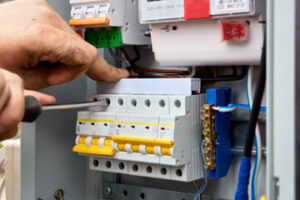Nashville Electrician installs, maintains, and repairs electrical wiring, systems, and fixtures. They also ensure that all work meets local and national safety codes. They can work in residential, commercial, and industrial settings.

Many electricians get their start through vocational training or apprenticeships. They may also attend trade school or a community college to obtain the necessary skills and knowledge.
Electricians work in a variety of settings, from residential homes to commercial and industrial buildings. They are responsible for the installation, maintenance, and repair of electrical wiring, systems, and equipment. In addition, they must be familiar with safety protocols and governmental regulations. They also use their skills to troubleshoot problems and determine the best solutions. Electricians also work closely with other professionals, such as engineers and construction workers.
An electrician’s job description includes many tasks, including: reading and interpreting blueprints and schematics to understand the layout of an electrical project. Inspecting and testing electrical equipment and wiring to ensure compliance with building and safety codes. Using a variety of tools to perform the job, such as ohmmeters and voltmeters. Performing physically demanding tasks, such as digging trenches to lay conduit and lifting heavy equipment. Installing and maintaining low-, medium-, and high-voltage electrical systems. Testing circuit breakers and transformers. Providing training and direction to other employees.
In addition to technical knowledge, a good Electrician should have excellent communication skills. They need to be able to work well with others and explain complex concepts in simple terms. They must also be able to read and interpret blueprints, plans, and specifications. They may need to write reports and documents, as well as maintain and update records.
The average salary for an electrician is between $35,300 and $57,500 per year. This figure can vary greatly depending on the industry in which they work, the level of experience, and whether they are an independent contractor or a member of a labor union. The earnings of an electrician are usually higher when working for a large corporation or as a part of a larger team.
Those interested in becoming an electrician should consider enrolling in a trade program or attending a vocational school to learn the necessary skills. Apprenticeship programs typically last for 4-5 years and require both classroom and on-the-job training. Vocational schools offer a more efficient way to get the necessary skills for this career, allowing students to complete the program in less than two years.
Education and training requirements
An Electrician works with a wide range of electrical systems and equipment, from home lighting and appliances to backup generators and security systems. This career requires a high degree of knowledge and expertise, as well as adherence to stringent industry codes. In addition, an electrician must be able to work independently and solve complex problems. To achieve this, an electrician must invest in training programs and professional certifications that will make them competitive in the job market.
Some electricians are self-employed, while others work for companies that contract them for specific projects. Many of these contractors are unionized, which makes it easier for them to negotiate contracts and benefits. Union membership also means that an employee has a centralized team to address any issues with a project, such as a labor dispute or safety issue.
Those interested in becoming an electrician should begin by researching the requirements for their state. Many states require a certain number of hours in the classroom and an apprenticeship program. In addition, most states have a board or department that oversees the certification process. In order to qualify for the exam, it is important to have a high school diploma or GED certificate. In addition, the aspiring electrician should be able to follow instructions and maintain good hand-eye coordination.
Once an aspiring electrician has qualified for their license, they should consider continuing education courses that will help them improve their skills and learn about new technologies in the field. These courses will also keep the aspiring electrician up-to-date on changes to national and local regulations. An electrician should also consider specializing in a particular area of electrical work, such as smart technology or renewable energy systems, which will make them more valuable to employers.
The education and training requirements for an Electrician can vary greatly depending on their career goals. Some may choose to attend a vocational school, while others might prefer an apprenticeship or on-the-job training. Regardless of the educational path taken, it is important to maintain a high level of professionalism and continue learning about new techniques and tools. In addition, an aspiring electrician should try to connect with other professionals in the field through community events and online forums. This will not only allow them to develop a network of potential colleagues, but will also keep them up-to-date on the latest developments in their field.
Salary
The salary of an electrician varies depending on the region in which they live, how long they have been licensed, and their level of experience. However, as more people enter the profession, average electrician salaries are expected to increase nationally. Electricians can also boost their income potential by gaining specific expertise or moving to a different industry. For example, electricians who specialize in solar systems or electrical maintenance can command higher wages than their counterparts who do not.
Early career electricians typically earn between $40,000 and $50,000 annually as they gain hands-on experience and learn the fundamentals of the trade. However, as their experience increases, they may start earning more than double that figure. These experienced electricians often take on a leadership role, overseeing more junior workers and tackling more complex projects. This increased responsibility also leads to higher bonus payments.
Aside from the salary, electricians can expect to receive a variety of other benefits. Some of these include health insurance and retirement plans. These perks can help ensure that electricians and their families are covered in case of emergency or unexpected medical needs. In addition to health insurance and retirement plans, electricians can benefit from other perks, such as flexible spending accounts or paid vacation days.
If you are looking to grow your business, consider using a service management software that allows you to easily track the time of your electricians and other field technicians. This will save you the hassle of transferring dozens of documents between employees and managers, or getting your techs into the office (and away from billable jobs) to sign off on timesheets. Moreover, the software will automatically sync all timesheets and payroll data for you, saving you hours of manual labor and money.
Work environment
The work environment of an electrician is varied. Depending on your specialization, you can work in commercial, industrial, or residential settings. Your responsibilities include inspecting wiring, testing equipment, and adhering to strict safety standards. You may also be required to travel to other sites for maintenance, repair, or installations.
You can expect to do a lot of manual labor in this field. You might be required to lift heavy objects, bend conduit, or stand and stoop for extended periods of time. You may also need to wear personal protective equipment such as rubber-insulated sleeves and gloves, hard hats, and safety shoes. The work can be dangerous, especially if you are not careful and follow all the necessary safety procedures.
If you are interested in becoming an electrician, it is important to get the right education and training before starting a career in this field. You can attend a vocational school or complete an apprenticeship program to acquire the skills needed for this job. These programs typically take 4-5 years and provide on-the-job training as well as classroom instruction.
Electricians are in high demand and can earn a good salary, but the work can be demanding. The job requires strong problem-solving skills and a willingness to learn. It is also a great choice for people who need hands-on, physical work to feel productive.
Some electricians may need to work in harsh environments, especially when working at power plants or in manufacturing facilities. These jobs involve wire/unwire large motors, troubleshoot electrical sensors like thermocouples, and perform other complex tasks. These electricians usually work on a schedule and sometimes have to work at night or weekends. They may also have to deal with a loud working environment.

